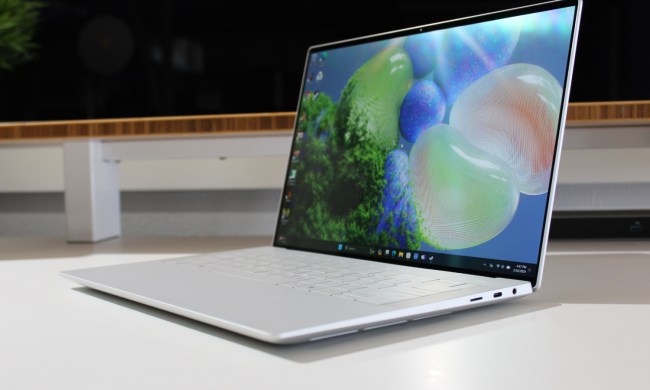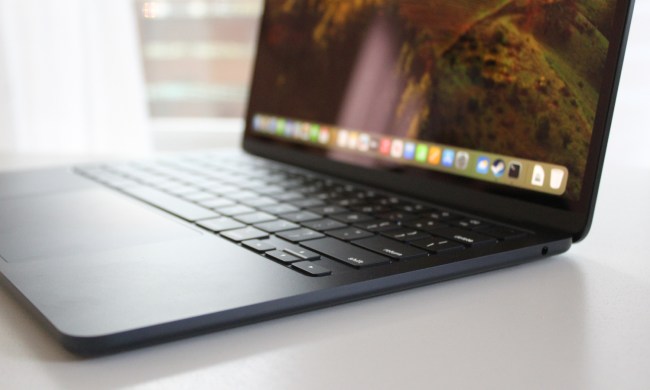- The best keyboard on a Mac
- Excellent performance for content creation
- The 16-inch screen is gorgeous
- Incredible speakers
- Touch Bar is still not useful
- Size can be unwieldy
The Intel MacBook Pro has been replaced by the M1 Pro and M1 Max models, available in 14-inch and 16-inch sizes. Read our full MacBook Pro review.
Lawsuits. Emergency repair programs. A never-ending barrage of online criticism. That’s the past three years of the MacBook Pro, in a nutshell.
The PR nightmare had just begun when I requested a Mac as my work laptop. The MacBook Pro was my default choice at home, handling music production and gaming in spite of its slim size and great battery life. My 2015 MacBook Pro had never let me down.
Yet my experience with the 2016 MacBook Pro was very different. Placed on my desk next to the mounting stacks of excellent Windows laptops, I found its keyboard frustrating. Its design looked dated. Even its performance felt limited.
Mac fans, myself include, want Apple to return the MacBook Pro to its former glory. The MacBook Pro 16 provides the first glimpse of hope in years. Is this the laptop I’ve been waiting for?
The Mac apology tour
The new 16-inch MacBook Pro isn’t revolutionary. It wasn’t launched at a glitzy press event. It’s not a leap forward in design, and it certainly isn’t innovative. It’s a patch.
At its core, the MacBook Pro’s design remains intact. The unibody aluminum chassis is still a strength, and Apple hasn’t dared to touch that this time around. The same goes for the Thunderbolt 3 port selection and the massive Force Touch trackpad.

However, once you get past the Space Grey of it all, small changes reveal a desire to please fans.
Even the thin bezels around the new 16-inch screen show Apple is listening to criticism. The chunky borders on other MacBooks have looked dated for years now. However, shrinking the bezels would have meant a smaller overall footprint, a smaller touchpad, and less room in the chassis for components.
Instead, Apple added an extra 0.6-inch of display, making for 3,072 x 1,920 resolution. The massive screen offers a fuller view of your work, perfect for multitasking or working in a complex application like Adobe Premiere. It’s not quite the 17-inch laptops of yore, but it’s close.
This is the best Mac keyboard ever released.
While the new display looks great, the keyboard is the most drastic change. Apple painted itself into a corner with its attempt to modernize the keyboard. The company calls the new set of inputs a “Magic Keyboard,” to match the still-popular iMac accessory. Its full millimeter of travel feels like an ocean compared to the prior design. The physical Escape key and the inverted “T” arrow keys make a return.
This is the best Mac keyboard ever released. It’s a step up over the 2015 model, with its larger keycaps and snappier mechanism, and it’s heads-and-tails over the butterfly-switch keyboard in the MacBook Pro 15.
The Touch Bar remains, and still feels useless. I find myself accidentally muting my music and wondering why it isn’t more useful. On the other hand, it usually stayed out of my way. I’ll put up with the Touch Bar so long as the keyboard is up to snuff.
When every millimeter counts
There’s more to the new MacBook Pro than a fixed keyboard. In fact, an extra .03 inches of thickness in the chassis has allowed Apple to add meaningful quality of change improvements, such as larger battery cells and a redesigned thermal system.
The larger battery is an important upgrade. Larger laptops with high-resolution screens often struggle with battery life, as did the 15-inch MacBook Pro. The MacBook Pro 16’s larger battery cells raise the total watt-hours of juice from 83.6 to 100, the largest battery you can cram in an FAA-approved laptop.

However, larger batteries don’t always mean more time away from a wall socket. In the case of the 16-inch MacBook Pro, powering the extra pixels appears to steal the extra juice the MacBook Pro 16 includes. The new model couldn’t power me through a full day of work.
Under my standard workload, which involves dozens of tabs, streaming music in Spotify, and Slack, the 16-inch MacBook Pro lasted around five and a half hours. In other words, that 16% larger battery isn’t producing 16% more battery life.
If you sit under bright office lights all day, beware. I consistently held the screen brightness above 75%, which explains why all the power went. It’s not as long as I’d like, but it’s in line with Windows options like the Dell XPS 15 with 4K display.
A video editor’s best friend
Inflating the chassis doesn’t mean better battery life, but it does help performance. The ultra-thin design of the 15-inch MacBook Pro provided adequate performance in 2016, but the first Core i9 processors were announced earlier in 2018, and suddenly presented new capabilities for laptops. Content creation. Video editing. Creative work. It was always possible, but it’s now far easier.
Apple tossed them into the 15-inch MacBook Pro. The result was severe throttling. It was so bad that the Core i7 often kept up with the Core i9 in a MacBook Pro 15, unless you ran the Core i9 in a freezer.

The refreshed 2019 MacBook Pro 15, with a newer Core i9 that added two more cores to the mix, improved the situation. However, laptops like the Dell XPS 15 still handled the chip better.
With the 16-inch MacBook Pro, Apple went back to the drawing board to redesign the thermals for this new class of high-end processors. Thinner fan blades, larger heatsinks, extra vents. It’s a complete re-work.
The difference is astounding. Despite using the same processor with the same 32GB of RAM, the 16-inch MacBook Pro leaves its predecessor in the dust in every benchmark and real-life test I threw at it.
I rendered a 4K two-minute clip in Premiere Pro, in ProRes 422, in just 4 minutes and 41 seconds. That same clip on the 15-inch MacBook Pro? It took twice as long. The MacBook pro 16 is now just as fast as the Dell XPS 15, which it always should’ve been. I shudder to think how fast it could have rendered that clip in Mac-optimized software like Final Cut Pro.
There’s more to its fantastic performance than increased airflow.
There’s more to these fantastic results than increased airflow. Adobe’s recent software optimizations play a big part of the equation, as do the new onboard graphics.
As with all recent MacBook Pros, the 16-inch model uses a custom card from AMD. But the Radeon Pro 5300M and 5500M aren’t your average update over last year’s graphics. These are based on AMD’s next generation of Zen 2 7nm graphics architecture, and assist in turning the MacBook Pro 16 into a serious powerhouse video editing machine.
Who is this for again?
The sparkle of a new MacBook Pro might tempt you in a few different ways, even if it’s not meant for you. If your day-to-day doesn’t involve running intensive applications, you won’t have much use for an eight-core (or even six-core) laptop.
For example, the new graphics hint at better game performance. The MacBook Pro 16 doesn’t live up to that expectation.
The MacBook Pro 16 is fast, but it’s not a gaming laptop.
Games like Fortnite and Rocket League are smoother than before, consistently running at framerates around 60 FPS at medium settings. You’ll always need to pay attention to the graphics settings, especially because of the off-kilter resolutions the 16-inch Pro can display natively.
Civilization VI had this problem, refusing to run in fullscreen and only hitting 53 FPS at Medium settings. The Dell XPS 15, with its Nvidia GTX 1650, will always be a better choice for gaming, offering a more conventional resolution and enough power for cranking up the settings a bit more. It can hit 50 FPS at Epic settings in Fortnite and 82 FPS in Civilization VI at Medium.
You also might consider it for simple everyday tasks, but again, it’s more power than you need. Unlike Dell or Microsoft, Apple doesn’t offer a larger MacBook Pro without a six-core or eight-core processor, discrete graphics, and 16GB of RAM.
The sheer size of the 16-inch MacBook Pro is a concern, as well. With a footprint of 14.09 x 9.68 inches, it’s not a laptop you’ll want to bring on an airplane, and it’ll need most of the table at your local coffee shop.

There is, however, a case to be made for someone who wants a high-end media experience out of their laptop. Apple has tuned the speakers well, and it claims an extra half-octave of bass. These are by far the best speakers you can find on a laptop, and you can feel it in the rumble of an explosion in The Mandalorian, or the kick drum in a song.
This display is gorgeous, too, though that’s to expected. It’s bright, the colors are accurate, and the contrast is high. The best displays from Dell and HP can compete with the MacBook Pro 16, but this huge screen makes for an immersive movie-watching experience. The 16:10 aspect ratio means you’ll always see letter-boxing, however.
Our take
For the first time in years, I can breath a sigh of relief and recommend a MacBook Pro. It does what Apple needed it to do, solving each of the complaints I’d held against the MacBook Pro. That elevates it back into the upper tier of premium laptops.
Are there any alternatives?
If you’re not using your laptop for content creation or other stringent tasks, you probably don’t need a laptop this large or this powerful. Opting for a 13-inch laptop like the Dell XPS 13, HP Spectre x360, or Surface Laptop 3 will save you hundreds of dollars. If you must go with a Mac, the 13-inch MacBook Pro is rumored to get an update in the first half of 2020.
The best true alternative to the 16-inch MacBook Pro, though, is the Dell XPS 15. When configured with similar specs, the XPS 15 is over a thousand dollars cheaper than the MacBook Pro 16-inch. That’s a lot of savings, all while providing similar performance, an OLED 4K screen, and better port selection.
Another option for content creators is the Asus ZenBook Duo Pro. On top of the unique second screen of this laptop, the Duo Pro has an OLED 4K screen and fantastic Core i9 performance. It’s still one of the most powerful implementation of that chip for video editors and content creators.
How long will it last?
Reliability has become a concern for Apple. The new keyboard is unlikely to have many of the same problems as before, and the laptop is no longer part of the emergency repair program. Considering how well-built and fully-loaded these laptops are, it should last at least five years.
The MacBook Pro comes with 90 days of technical support and a standard one-year limited warranty. You can, of course, extend coverage to up to three years using AppleCare+ and in-store repair.
Should you buy it?
Yes. If you’ve been waiting for a powerful MacBook you can rely on, this is it.




